In my practice as a gut health dietitian I love learning about the emerging research in the field of gut health including the gut microbiome. Let’s talk all about the gut microbiome and what diet is best for the gut microbiome. Furthermore, can the gut microbiome be used to predict your diet? Learn more here!
What is the best diet for the gut microbiome?
Which dietary pattern is best for your gut microbiome (GM)? 🤨
🔥Hot off the press, the American Gut Project analyzed 1800 adults diets and found that certain dietary patterns (rather than individual dietary features) were significantly associated with enhanced diversity of the GM.
Simply put – the whole of a persons diet seems to matter more when it comes to diversity than whether or not they consumed an individual food or food type.
⭐The dietary patterns they were able to tease out as having differing effects on the gut microbiome were:
- Plant-based diet (including vegetarians/vegans)
- Flexitarian diet
- Health-conscious western diet
- Western-like diet
- Exclusion diet (paleo/low carb)
The authors suggest we could view these diets as a gradient; and shifting up that gradient means more plants, less animal products, and better diet quality.
Sounds pretty good to this gut health dietitian! 🤟
DOI: 10.1093/ajcn/nqab332
What about the mediterranean diet for the gut microbiome?
I’m a huge Mediterranean diet fan if you haven’t figured that out by following along here!
In a recent systematic review, researchers pooled together the results of 6 studies looking at the role diet played on production of short chain fatty acids (SCFA’s).
SCFA’s play an important role in maintaining our gut barrier (preventing ‘leakiness’ so-to-speak) and regulating our immune system (after all, 70% of your immune system is found in the gut!) which is why they are SO important. They are produced when our microbes digest fibre and other important compounds like phytochemical.
They found that the Mediterranean diet increased those good-for-you SCFA’s!
Not surprising as the Mediterranean diet is high in fibre and phytochemicals.
So how do you eat in more of a Mediterranean style dietary pattern?
- 🥕 most of your intake should come from fruits, vegetables, whole grains, pulses (beans peas & lentils), and nuts & seeds
- 🐟 fish and seafood should be a star protein! I like to say aim for 2-3x per week. My go to’s include canned tuna, salmon, and shrimp for easy dinners and leftover lunches. It’s hard when you’re land locked!
- 🍗 moderate intake of poultry and dairy
- 🥩🍬 red meat and treats less often
What I love about this dietary pattern is, it isn’t a set of rules and can easily be adapted to many styles of eating and many eating goals, with a focus on ‘adding in’ instead of taking away.
Our dietitian, Ashley, created a fun Med Diet and the Microbiome course on how to begin incorporating these principles in to your eating for gut health!
doi: 10.3390/ijms22136728
Can the gut microbiome predict your diet?
Can the gut microbiome predict who will respond to the low FODMAP diet?
In a new study, researchers compared changes in the gut microbiome of those with IBS-D in 2 dietary interventions: The Low FODMAP diet, and traditional dietary approaches to managing IBS (essentially the NICE guidelines).
What they found was really interesting!
In the group that received the Low FODMAP intervention, they were able to see that the likelihood of response was associated with those that have a microbial population REALLY GOOD at fermenting carbohydrates, or a high proportion of saccharolytic bacteria (a high fermentation index).
Since the fermentation of FODMAPs contributes to digestive discomfort, this wasn’t entirely surprising; it would make sense that if you had a lot of carbohydrate fermenting microbes, the bloating, gas, and diarrhea would improve when you took their fuel source, or FODMAPs away.
The Gut Microbiome in Health and Disease
In fact, in previous studies, those with IBS-D have been found to have a higher proportion of Bacteroides in their microbiome, which have the capability of fermenting large quantities of carbohydrates.
After 3 weeks of the Low FODMAP diet, those that responded saw a drop in saccharolytic bacteria. In addition, there was a significant reduction in pro-inflammatory bacteria that are known to contribute to low level inflammation in the gut and a compromised gut barrier.
Since these changes to the gut microbiome were not seen in the non-responder group, this preliminary research demonstrates that the gut microbiome could not only predict who will respond to the low FODMAP diet, but demonstrates the important role diet plays in reducing patient symptoms by way altering the make-up of gut microbiome.
The Future of Gut Microbiome Research
As we learn more about the gut microbiome, we can look forward to a day where testing could help us to find the right diet to manage patient symptoms quickly – rather than guessing who would do best with a low FODMAP versus traditional dietary approach.
DOI: 10.1093/ajcn/nqab005
You are what you drink?
People often say “you are what you eat”, but what about “you are what you drink”? 💦
Please note, I realize the phrase “you are what you eat” can be problematic from a diet culture perspective, but here I want to focus on the gut science side of things. The foods we eat can influence our digestion and our gut microbiota. However, we don’t hear quite as much about how fluids we drink might also influence our gut bacteria. So do they?
Absolutely!
In particular, the microbial community in the water that we drink influences the microbial community in our bodies, including our digestive tract. Water comes from many different environmental conditions and goes through different treatments, so the bacteria present in the types of water we drink can be vastly different – so what’s best?
Research from the American Gut Project found that the type of drinking water participants drank was one of the key factors explaining their gut microbiota composition and was EQUALLY as influential as the type of diet they consumed.
Participants in this research were drinking the following types of water:
- 💦bottled water
- 💦tap water
- 💦filtered water
- 💦well water
Can well water influence the gut microbiome?
The findings of this study showed that participants who consumed well water most often had more types of bacteria in their gut compared to those who primarily drank the other types of water.
While we still have lots to understand about how this actually influences our health, it’s pretty cool to think that simply drinking water (I recognize it’s a privilege to have access to safe drinking water daily), may influence our health by way of our gut microbiota!
Why is it bad to not drink enough water?
Aside from the type of water we consume, the quantity we drink is also important. Approximately half of adults drink below recommended amounts each day and evidence shows there is a difference in abundance of certain types of bacteria in low vs. high water drinkers. For example, low water drinkers had more Campylobacter bacteria, which is often associated with diarrheal diseases.
The takeaway here
focus on staying hydrated! We don’t know enough about the BEST sources of water just yet, but simply drinking it is a positive way to support a healthy gut microbiome.

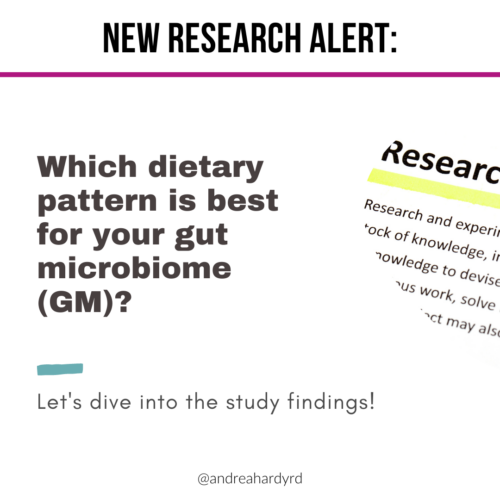
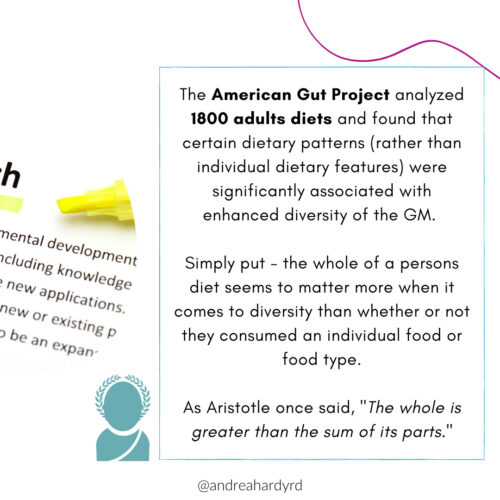
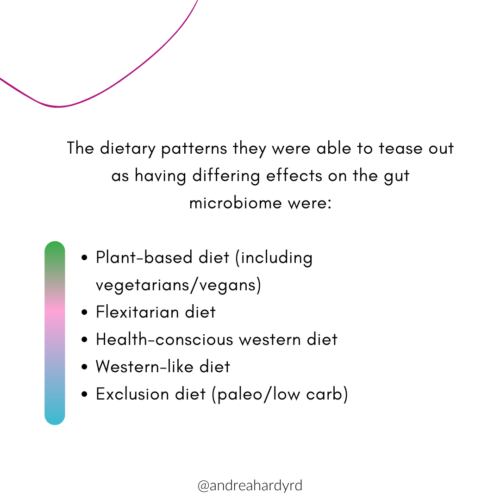
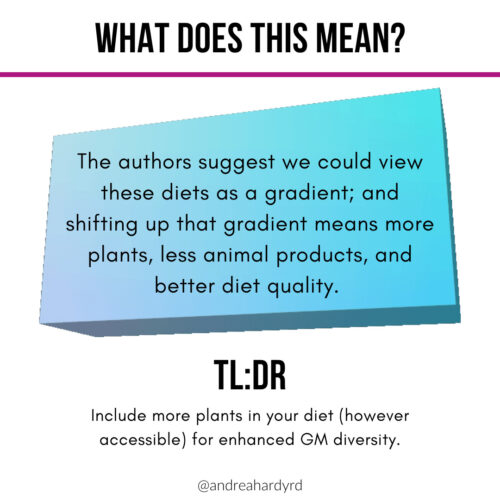

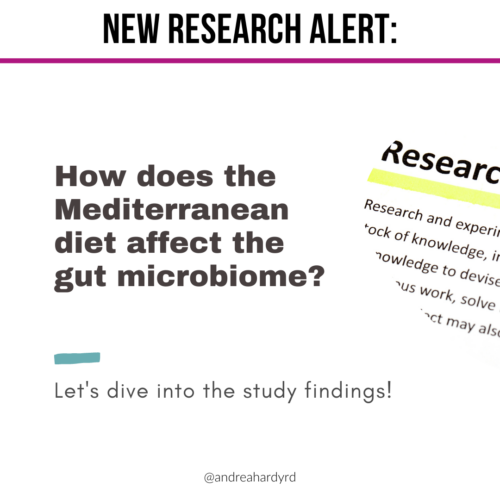
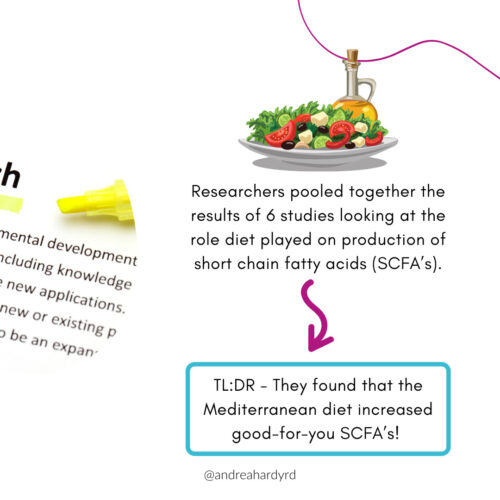
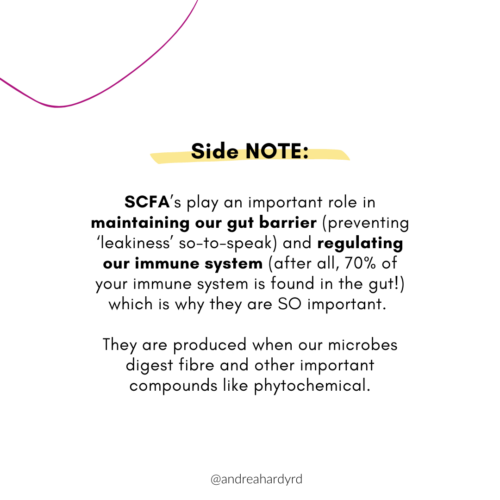
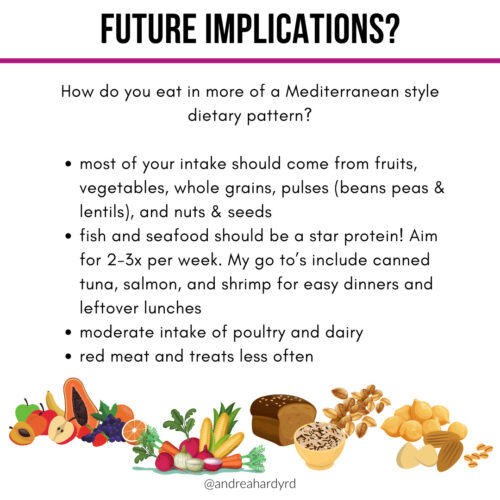


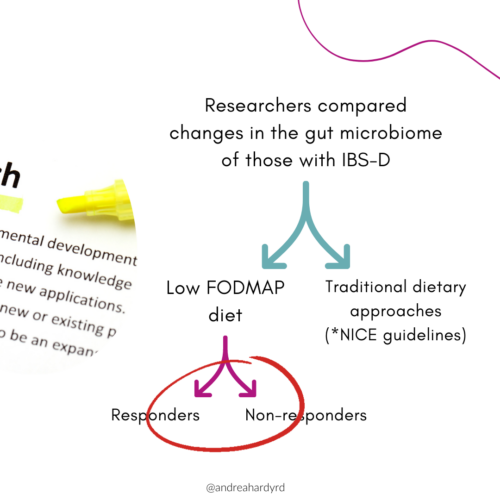
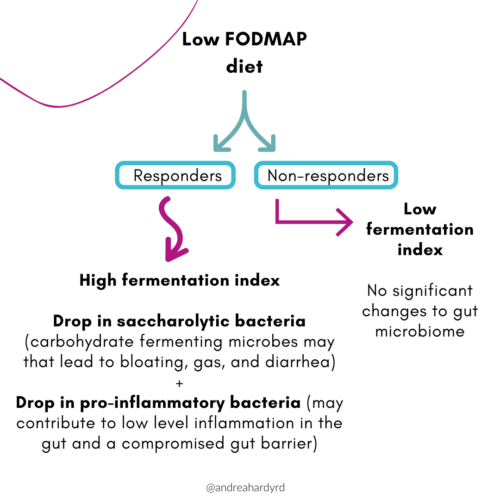
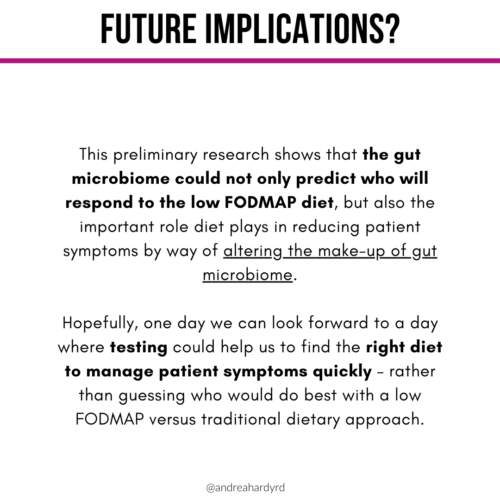

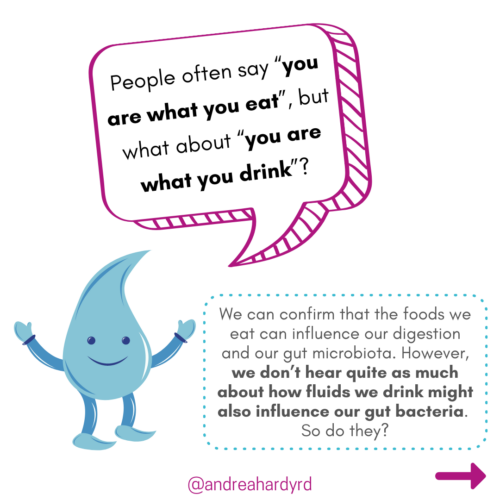
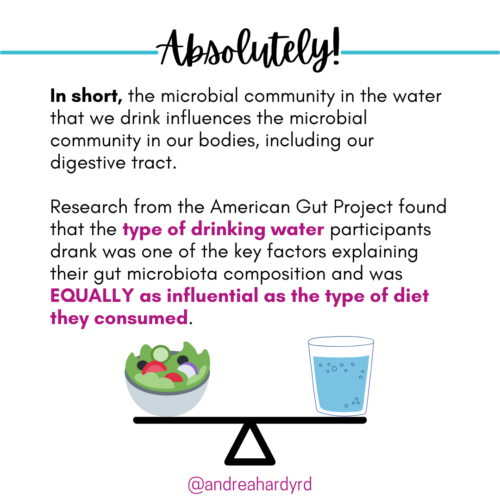
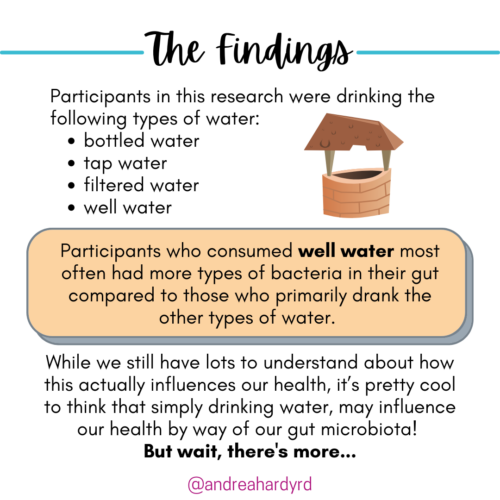
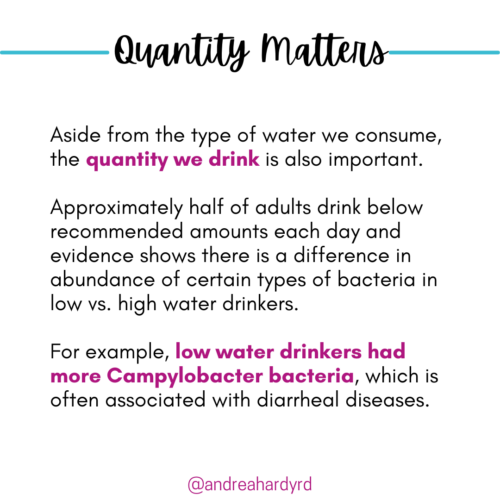
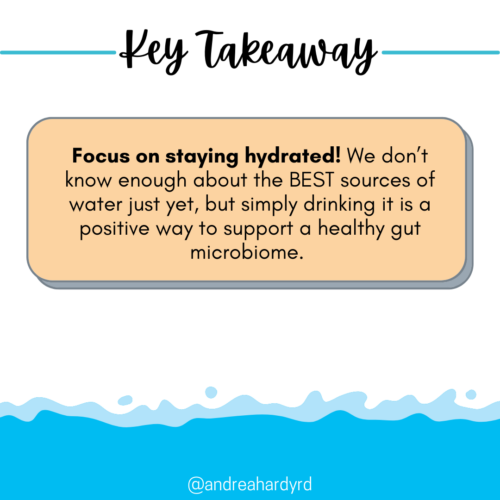
Recent Comments